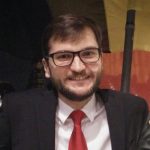Aitana Radu
 Before joining the University of Malta’s Dept. of Information Policy and Governance Dr.Radu worked for six years as a researcher in the field of security and intelligence studies for the ”Mihai Viteazul” National Intelligence Academy in Bucharest, Romania.
Before joining the University of Malta’s Dept. of Information Policy and Governance Dr.Radu worked for six years as a researcher in the field of security and intelligence studies for the ”Mihai Viteazul” National Intelligence Academy in Bucharest, Romania.
Dr. Radu obtained her M.A.(Comparative Politial Science) from the University of Bucharest with a thesis on democratic transitions in the Middle East, her M.A. in the Management of Intelligence Activities for National Security from the National Intelligence Academy with a thesis on the security risks posed by the radical Islamic discourse and her PhD in Intelligence and National Security from the National Intelligence Academy with a thesis on the transformation of intelligence organizations.
Since 2013, Dr. Radu has worked on several European-funded projects both in the design and implementation phase, working as Assistant Manager for research/training infrastructure development projects funded under the European Regional Development Fund (INTELLISEC project) and the Prevention of and Fight against Crime Programme – ISEC 2013 (ARMLET project) and as a researcher in H2020 projects (CITYCoP and CARISMAND projects).
Teaching
Dr. Radu has had experience of teaching and supervising undergraduate and post-graduate students carrying out research in the areas of intelligence transformation and intelligence organizations in Romania. Her primary focus within teaching programmes at the University of Maltaare interdisciplinary courses and research at Masters and PhD level at the intersection of Information Policy and Security Science.
Selected publications
Bogdan, A. (2015) ”Strategies for Organisational Transformation. A Complexity Approach to Intelligence”, Geopolitica, Bucharest, Year XIII, no. 61 (3/2015).
Bogdan, A. (2014) ”Building an Intelligence Strategy in the Information Age”, Geopolitica, Bucharest, ISSN 1583-543X.
Bogdan, A. (2014) ”Romania and Right-Wing Extremism. A Network Approach”, Univers Strategic, Bucharest, ISSN 2067-7464.
Oskar Josef Gstrein

Mag. Dr. Oskar Josef Gstrein, LL.M. has studied law and philosophy in Innsbruck, Austria and obtained the Magister iuris and the Magister philosophiae diplomas. In the summer term of 2008 he studied the law of the European Union at the Humboldt University in Berlin where he also participated in seminars at the faculty of philosophy. In one of the seminars he dealt with the topic of the representation of personality in social networks.
In the year 2009 he did an internship in the European Parliament in Brussels, Belgium with visits to Strasbourg, France. In 2011 he finished the LL.M. programme at the Europa-Institut in Saarbrücken, Germany where he subsequently became research associate. His thesis was awarded with the Hans-Werner Osthoff Prize for excellent achievements by young scientists and published. He is author of numerous articles in the field of European Integration and co-editor of the book "The EU between 'an ever closer Union' and Inalienable Policy Domains of Member States". He gained specific expertise in questions of Human Rights Protection in the Digital Context, European Constitutional Law and International Public Law. He also participated in the "General and Specialized Courses on Human Rights Law" at the European University Institute in Florence, Italy in June 2015.
During his PhD Project entitled "The Right to be forgotten as a human right -- is there a future for human dignity in the Digital Age?" he published several articles on the subject. The thesis was defended in November 2015 and awarded the grade "summa cum laude".
Since the October of 2015 he is a post-doc research fellow at the Security, Technology & e-Privacy (STeP) Research Group at the University of Groningen, reporting to the co-directors of STeP: the Chair in European Technology Law and Human Rights, Professor Jeanne Mifsud Bonnici and the Chair in European Information Policy & Technology Law, Professor Joe Cannataci. Part of his duties are expected to be linked to assisting Prof Cannataci in his work as UN Special Rapporteur for Privacy and Overall Co-ordinating person for the MAPPING Project.